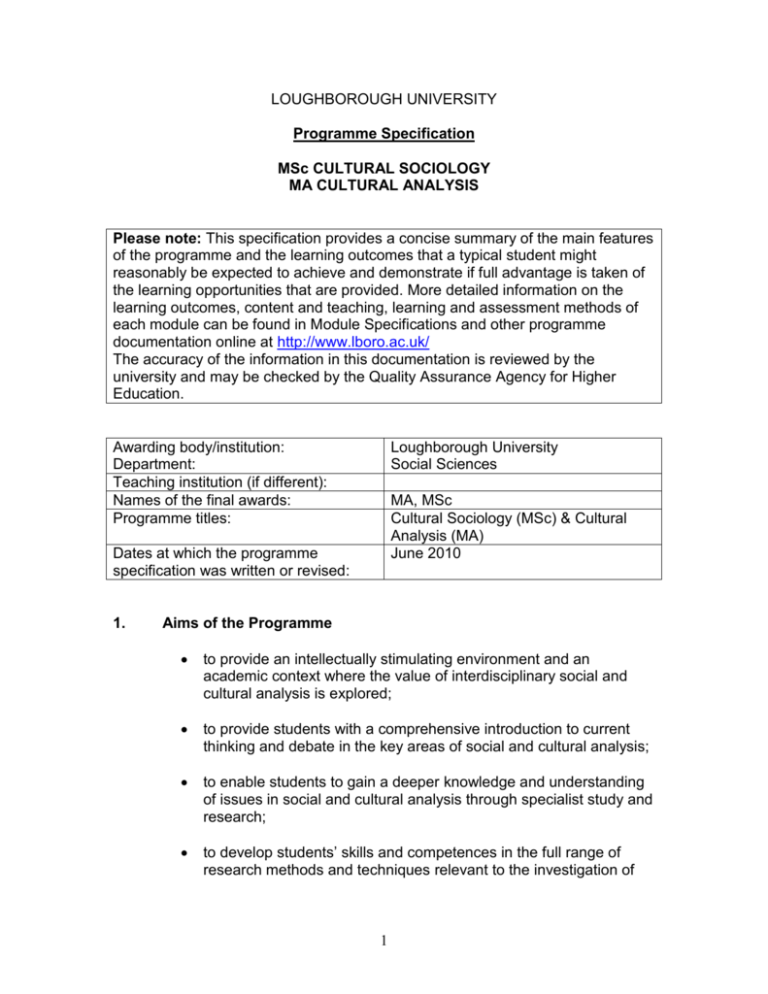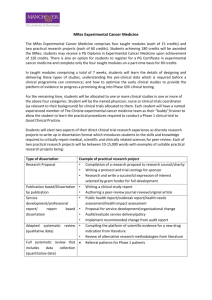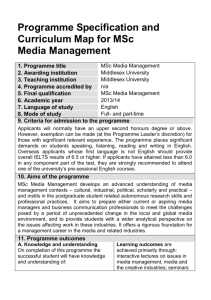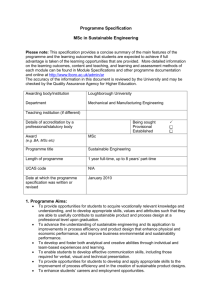Cultural Analysis MA.. - Loughborough University
advertisement

LOUGHBOROUGH UNIVERSITY Programme Specification MSc CULTURAL SOCIOLOGY MA CULTURAL ANALYSIS Please note: This specification provides a concise summary of the main features of the programme and the learning outcomes that a typical student might reasonably be expected to achieve and demonstrate if full advantage is taken of the learning opportunities that are provided. More detailed information on the learning outcomes, content and teaching, learning and assessment methods of each module can be found in Module Specifications and other programme documentation online at http://www.lboro.ac.uk/ The accuracy of the information in this documentation is reviewed by the university and may be checked by the Quality Assurance Agency for Higher Education. Awarding body/institution: Department: Teaching institution (if different): Names of the final awards: Programme titles: Loughborough University Social Sciences MA, MSc Cultural Sociology (MSc) & Cultural Analysis (MA) June 2010 Dates at which the programme specification was written or revised: 1. Aims of the Programme to provide an intellectually stimulating environment and an academic context where the value of interdisciplinary social and cultural analysis is explored; to provide students with a comprehensive introduction to current thinking and debate in the key areas of social and cultural analysis; to enable students to gain a deeper knowledge and understanding of issues in social and cultural analysis through specialist study and research; to develop students’ skills and competences in the full range of research methods and techniques relevant to the investigation of 1 culture and society (this to include specialist study in quantitative methods and data collection on the MSc route); 2. to enhance students’ ability to question existing theories and research findings on the basis of a thorough knowledge and understanding of relevant theoretical frameworks and research methods; to enable students to appreciate alternative models and perspectives in social and cultural research; to require students to demonstrate their command of relevant concepts, theories and methods by undertaking a series of research-based coursework assignments, and devising and executing a sustained piece of original research on a topic of their choice to be presented in their dissertation; to equip students with the knowledge and skills to proceed to advanced research in cultural sociology and cognate fields of inquiry; to enable students to meet either the requirements for research training of the AHRC (the MA route in the programme) or the requirements for research training of the ESRC (the MSc route in the programme); to enhance students’ career and employment opportunities on graduating; To ensure that students on graduation from the programme are fully aware of ethical and public-interest issues in the conduct of academic research and the publication of knowledge. Relevant Subject Benchmark Statements and Other External and Internal Reference Points used to inform Programme Outcomes The Benchmark Statement for Sociology The National Qualifications Framework University Learning and Teaching Strategy Departmental teaching and learning policies Both AHRC and ESRC criteria for research training The research interests and specialisms of the teaching staff and their professional involvement in the academic fields of social and cultural analysis. 2 3. Intended Learning Outcomes Knowledge and understanding On successful completion of the programme, students should be able to demonstrate knowledge and understanding of the following: major traditions and frameworks of social and cultural theory; current debates on appropriate theories and frameworks in cultural sociology; methodological principles of research in the cultural and social sciences; a range of different research techniques, their epistemological and ontological assumptions and practical applicability; various dimensions of social inequality throughout the world today, their historical sources and current processes of reproduction; forms of cultural difference and diversity situated locally, nationally and globally; globalisation and localisation of social and cultural phenomena; structures, processes and the experiential/biographical aspects of social and cultural life; institutional contexts and politics of social and cultural research. teaching, learning and assessment strategies to enable outcomes to be achieved and demonstrated The programme is delivered by a combination of lectures (incorporating visual aids and other materials); seminars; personal tutorials (particularly for advice on assignments and research projects); and group workshops and computer laboratory sessions linked to practical teaching in research methods. Students are required to work both individually and in small groups. In addition to the Departmental Handbook, students are provided with a Programme Handbook that gives them information about the 3 programme structure and scheduling of modules and assignment work, learning resources, teaching staff, programme regulations and advice on studentship. They also receive module handbooks, including guidance on reading, assignments and assessment, and materials, such as learning packs. Module material such as lecture overheads are provided on the university’s Learnserver. The programme combines study of theoretical knowledge, methodology and practice in research skills. As students progress through the programme, from general instruction on theories and methods to specialist topics, they are enabled to develop personalised interests, which culminate in their work for the Dissertation Research Project. There, mediated by the module in Research Design, the theoretical knowledge and practical skills acquired in the programme are brought into synthesis for the design and implementation of individual projects, realised in analysis and explanation. Student work is commented upon critically and constructively in order to enable progression throughout the programme. Assessment is by coursework assignment, project write-ups and the dissertation, which for students wishing to proceed to research for a doctorate may function as pilot work. Skills and other attributes (a) subject-specific cognitive skills On successful completion of the programme, students should be able to: understand theoretical and methodological principles of social and cultural analysis; apply disciplinary knowledge to cultural and social evidence; formulate theoretically-informed research questions and generate research data according to set procedures and methods; organise and classify information gathered in assignment and project work; appreciate the peculiarities of particular cases and explore possible generalisations from them in a comparative framework; modify existing paradigms of research in the light of new empirical evidence; 4 think reflexively about research, the role of the researcher and the implications for public understanding and policy. teaching, learning and assessment strategies to enable outcomes to be achieved and demonstrated in subject-specific cognitive skills Critical reasoning, analytical skills, ability to debate issues, and awareness of the appropriate use of research methods are stimulated through lectures, seminar discussion, research workshops and individual consultation. Students are encouraged to consider and engage with a diversity of viewpoints and approaches whilst drawing reflexively on their own experience in formulating problems. In preparing written coursework and practical assignments, students are advised on how to structure and substantiate arguments, present relevant evidence effectively, and use approved academic conventions of citation, referencing and quotation, especially with a view to avoiding plagiarism. (b) subject-specific practical skills On successful completion of the programme, students should be able to: engage critically with major thinkers, debates and intellectual paradigms in the field of cultural sociology, productively employing the insights gained in their own work; demonstrate their capacity to develop appropriate research strategies to address issues they have selected for sustained investigation in self-chosen topics; select and apply appropriate techniques for the analysis of primary and secondary data; analyse new and emerging trends in the social and cultural worlds; interrogate both common-sense understanding and received wisdom critically in relevant areas of inquiry; identify processes of structural and experiential change in everyday culture and social life across the full range from local to global settings; 5 represent research findings in textual form that may include visual and aural material as well as written material. teaching, learning and assessment strategies to enable outcomes to be achieved and demonstrated in subject-specific practical skills Students are given practical training in accessing relevant sources and in qualitative, quantitative and combined research techniques as appropriate for the problem under consideration that facilitate the study of culture and society. Guidance is given on the proper use of academic conventions and the evaluative criteria used in assessing intellectual argument and academic debate. (c) key transferable skills On successful completion of the programme, students should be able to: identify and retrieve information from electronic and hard-copy sources and critically evaluate these sources; collate and manage a research bibliography; demonstrate well-developed writing and interpersonal communication abilities; deploy a wide range of research techniques effectively and with full awareness of their respective strengths and weaknesses; plan, originate and manage with appropriate supervision a significant self-directed project; work flexibly, creatively and independently, displaying a high degree of self-direction and initiative; think critically and apply this ability to new issues in various situations; act ethically and reflexively with due consideration for the public interest. teaching, learning and assessment strategies to enable outcomes to be achieved and demonstrated 6 Transferable skills are developed through the various tasks required of students and by the development of their performance as they progress through the programme. Students are encouraged to develop skills of personal time management together with the ability to produce work to deadline and in the forms required. They are expected to assume an increasing degree of responsibility for formulating, planning and executing self-directed work and, where relevant, to enhance their collaborative and team-working skills through participation in practical group projects. Assessment of skills constitutes a major criterion for the assessment of coursework and individual projects, alongside the assessment of knowledge and understanding. 4. Programme Structures and Requirement Levels, Modules, Credits and Awards Students are required to take modules amounting to 180 credits in the programme overall. The MA Dissertation Research Project is worth 50 credits and the MSc Dissertation Research Project is worth 60 credits. Instruction in methods and research technique modules are worth 15 credits and all other modules 20 credits. The MA is designed to meet the requirements for research training at master’s level of the Arts and Humanities Research Board (AHRC). It is principally concerned with training in qualitative research methods and contains option modules that cover a range of substantive areas in cultural sociology. The MSc is designed to meet the requirements for research training at master’s level of the Economic and Social Research Council (ESRC). It covers a range of both qualitative and quantitative research methods and places greater weight on the Dissertation Research Project than is so in the MA route. All modules are compulsory for the MSc so that students are obliged to study and practice a wider set of research techniques than for the MA degree. Because both master’s degrees are designed to train students in research methods appropriate to preparation for further study at doctoral level they share a number of common theoretical and methodological elements, disciplinary and interdisciplinary, that are relevant across both the humanities and the social sciences. 7 Full details can be found in the Programme Regulations at: http://www.lboro.ac.uk/admin/ar/lps/progreg/year/1011/docs/Cultural%20Soci ology%20MSc.doc MA Cultural Analysis Compulsory Modules (140 credits) Option Modules (40 credits) Social and Cultural Analysis Media and Modernity Ethnographic Research Techniques Textual Analysis Research Techniques Research Design for Cultural Sociology Dissertation Research Project A Digital Futures –Explorations in New Media Culture, Media and Everyday Life Culture, Media and Globalisation Visual Cultures Popular Music and Modern Times Audiences and Consumers Citizenship and Communications Cultural Policy Media, Nations and Nationalisms Global Communications Rhetoric and Discourse Cultural Criminology MSc Cultural Sociology All modules are compulsory (180 credits) Social and Cultural Analysis Media and Modernity Ethnographic Research Techniques Textual Analysis Research Techniques Quantitative Methods and Analysis I Quantitative Methods and Analysis II Research Design for Cultural Sociology Dissertation Research Project B The Postgraduate Diploma (PgDip) can be awarded to candidates who have achieved 100 credits overall (average pass mark, 50%) and 40% in at least in one other module. The MA and MSc are awarded to candidates who have 8 achieved 160 credits (average pass mark, 50%) and at least 40% in the remaining module. A Distinction is awarded to candidates for averaging 70% or above in 160 credits and at least 50% in the remaining module. 5. Criteria for Admission to the Programme A typical offer would be a good first degree (normally an Upper Second or First Class award) or equivalent. Alternatively, offers may be based on evidence of senior professional experience. Where relevant, qualifications in written and spoken English may be required, normally equivalent to a score of 7 in IELTS. 6. Information about Assessment Regulations All modules are assessed by written work, coursework and project. The pass mark for a module is 50% and credit is awarded for each module in which a pass is achieved. Any student who fails to meet the requirements for achieving credit in a module has the automatic right of reassessment on one occasion only. With the exclusion of the Dissertation Research Project module, candidates who have a right of reassessment in a module can opt for reassessment at an earlier date than that of the next routine assessment of the module. Full details of these arrangements are contained in the official Programme Regulations. 7. What makes the Programme Distinctive The programme is largely taught by members of the Sociology team, all of whom have doctorates and significant research and publication records. They are all research active and experienced teachers. Parts of the programme are taught by other members of the Department who are expert in their fields. The programme draws upon shared modules from the MRes Social Research and the MA Media and Cultural Analysis in addition to core Cultural Sociology modules. 8. Particular Support for Learning http://www.lboro.ac.uk/admin/ar/templateshop/notes/lps/index.htm 9 9. Methods for Evaluating and Improving the Quality and Standards of Learning http://www.lboro.ac.uk/admin/ar/templateshop/notes/lps/index.htm 10







